Episode 567: Portrait of a Local Flower Pioneer, with Seattle Wholesale Growers Market’s General Manager Brad Siebe, including updates about their new ecommerce platform
July 20th, 2022
Podcast: Play in new window | Download
Subscribe: Apple Podcasts | Podcast Index | RSS | More
If you are a longtime Slow Flowers member or follower, you know that the origins of our organization are closely rooted with those of the Seattle Wholesale Growers Market.
I was present at the 2010 regional meeting of the Association of Specialty Cut Flower Growers, which was held at Charles Little & Co., in Eugene. That’s when a group of Oregon and Washington flower farmers began to discuss banding together to establish a new flower hub in the Pacific Northwest. They studied the model of the Oregon Flower Growers Association, a producer-owned cooperative founded in 1942, and agreed to pursue the formation of a similar but updated wholesale flower marketplace in Seattle.
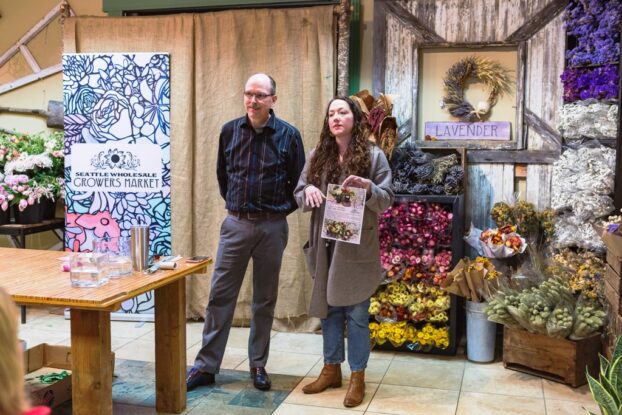
The following April, in 2011, the Seattle Wholesale Growers Market Cooperative opened for business in Seattle’s Georgetown neighborhood, not far from the conventional wholesale companies who has shown little interest in doing business with those local flower farms.
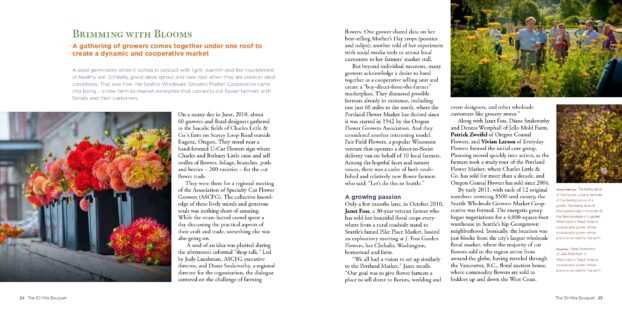
You can read the story of these beginnings in my 2012 book, The 50 Mile Bouquet, and ever since that first 2010 meeting in a flower field, I have been the self-appointed “embedded journalist” who has documented the story of Seattle Wholesale Growers Market.
Known now as “the Market”— the destination is essential to the floral industry’s fabric in the Pacific Northwest. The Market has been studied, as other regional groups of flower farmers – all across the U.S. and Canada – have emulated its model to establish a market for local flowers in their communities.
I’ve had the privilege of interviewing most of the farmers who are part of the Market, visiting their farms and spending time learning from them, not to mention enjoying the beauty and superior quality of their floral crops.
In 2020, the Market moved to the next level with the hiring of Brad Siebe as general manager. Brad’s background as president and CEO of one of the Seattle area’s largest independent garden centers and also in general management in the commercial construction industry, has helped the Market weather the challenges of Covid and come out on the other side stronger and more successful.
I asked Brad to give us an update about what’s been happening with the growth of the Market, and we recently sat down for a conversation in the plant room there.
Find and follow Seattle Wholesale Growers Market on Instagram
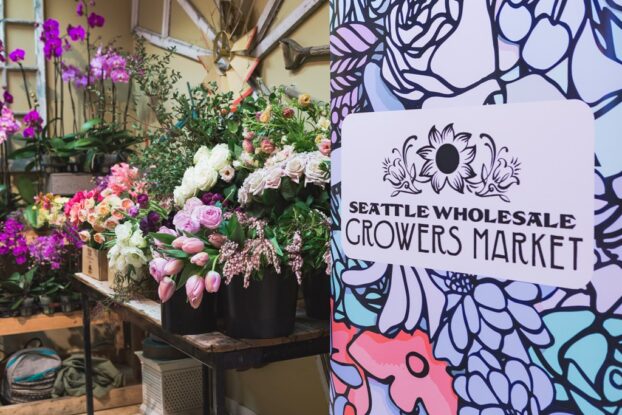
Read: Seattle Wholesale Growers Market’s history and Cooperative Model, authored by cooperative expert Margaret Lund.
Watch this compilation from the Farm to Florist Series
More News of the Week
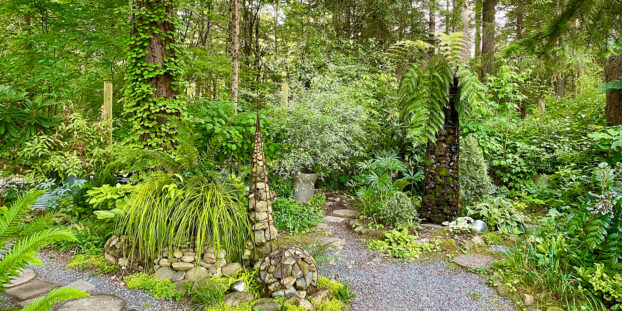
COLOR IN THE GARDEN: First up, if you are in the Pacific Northwest, you’re invited to join me and several of my plant-lover friends on Sunday, August 7, at Old Goat Farm in Graham, Washington for “A Day of Color in the Garden.” This is a program of Garden Communicators International, of which I am past president. Open to all, the event includes invites you to immerse yourself in a day exploring the joy of color in the garden, art, photography, and fresh flowers. Our setting is the destination nursery Old Goat Farm, known for rare plants and luscious display gardens — located about 1.5 miles southeast of Seattle. Lunch is provided, and all participants receive a copy of Lorene Edwards Forkner’s new book “Color In and Out of the Garden.” I’ll share a floral design demonstration with hyper-local and seasonal flowers and plantsman Greg Graves will lead a tour of Old Goat Farm. We’ll also hear from photographer Grace Hensley, who will share her secrets for making magical garden photos using your phone. The ticket includes all watercolor supplies, Lorene’s book and lunch — all for $85. Register here.
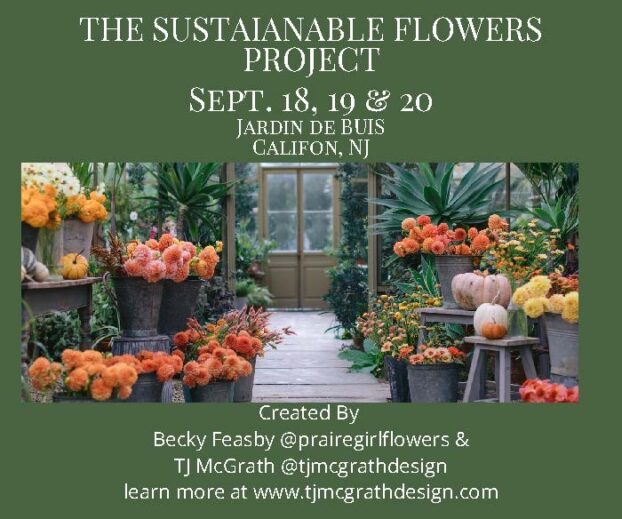
SUSTAINABLE FLOWERS PROJECT: Slow Flowers has signed on as a partner in the September workshop produced by two of our members, Becky Feasby and TJ McGrath — the Sustainable Flowers Project. The three-day intensive + creative workshop explores sustainability with some of the biggest leaders in sustainable floristry today. The location: Jardin de Buis, in Califon, New Jersey; the dates: September 18-20, 2022.
You’ll learn from Ingrid Carozzi, Tin Can Studios; British Designer Shane Connolly, Shane Connolly + Co.; flower farmer and social justice activist Amber Tamm, as well as Andrea Fillippone and Eric Fleisher, environmental designers and owners of Jardin de Buis, as well as from Becky and TJ. They have created a special $150-off promo code for Slow Flowers members who sign up. Register here with SF150.
Thank you to our Sponsors
This show is brought to you by Slowflowers.com, the free, online directory to more than 850 florists, shops, and studios who design with local, seasonal and sustainable flowers and to the farms that grow those blooms. It’s the conscious choice for buying and sending flowers.
Thank you to our lead sponsor, Farmgirl Flowers. Farmgirl Flowers delivers iconic burlap-wrapped bouquets and lush, abundant arrangements to customers across the U.S., supporting U.S. flower farms by purchasing more than $10 million dollars of U.S.-grown fresh and seasonal flowers and foliage annually. Discover more at farmgirlflowers.com.
Thank you to Longfield Gardens, which provides home gardeners with high quality flower bulbs and perennials. Their online store offers plants for every region and every season, from tulips and daffodils to dahlias, caladiums and amaryllis. Check out the full catalog at Longfield Gardens at longfield-gardens.com.
Thank you to Johnny’s Selected Seeds, an employee-owned company that provides our industry the best flower, herb and vegetable seeds — supplied to farms large and small and even backyard cutting gardens like mine. Find the full catalog of flower seeds and bulbs at johnnysseeds.com.
Thank you to The Gardener’s Workshop, which offers a full curriculum of online education for flower farmers and farmer-florists. Online education is more important this year than ever, and you’ll want to check out the course offerings at thegardenersworkshop.com.
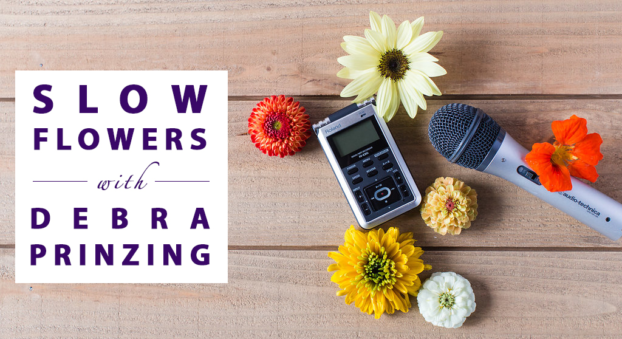
Thanks so much for joining us today! The Slow Flowers Podcast is a member-supported endeavor, downloaded more than 868,000 times by listeners like you. Thank you for listening, commenting and sharing – it means so much. As our movement gains more supporters and more passionate participants who believe in the importance of our domestic cut flower industry, the momentum is contagious. I know you feel it, too.
If you’re new to our weekly Show and our long-running Podcast, check out all of our resources at SlowFlowersSociety.com and consider making a donation to sustain Slow Flowers’ ongoing advocacy, education and outreach activities. You can find the donate button at slowflowerspodcast.com.
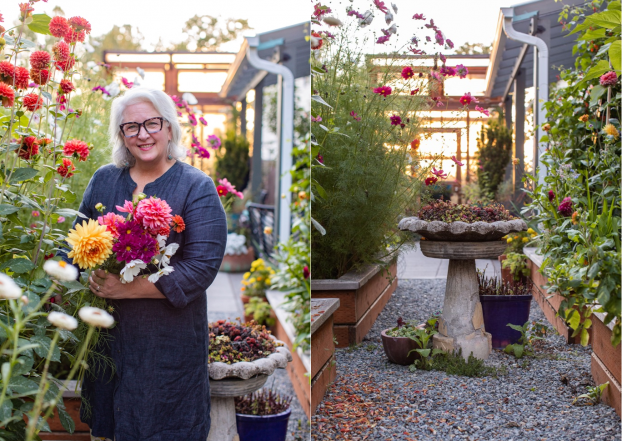
I’m Debra Prinzing, host and producer of the Slow Flowers Show & Podcast. The Slow Flowers Podcast is engineered and edited by Andrew Brenlan. The content and opinions expressed here are either mine alone or those of my guests alone, independent of any podcast sponsor or other person, company or organization. Next week, you’re invited to join me in putting more Slow Flowers on the table, one stem, one vase at a time.
Music credits:
Homegrown; Turning on the Lights; Falaal; Gaena
by Blue Dot Sessions
http://www.sessions.blue
Lovely
by Tryad
http://tryad.bandcamp.com/album/instrumentals
http://creativecommons.org/licenses/by-sa/3.0/
Acoustic Shuffle; In The Field
audionautix.com









